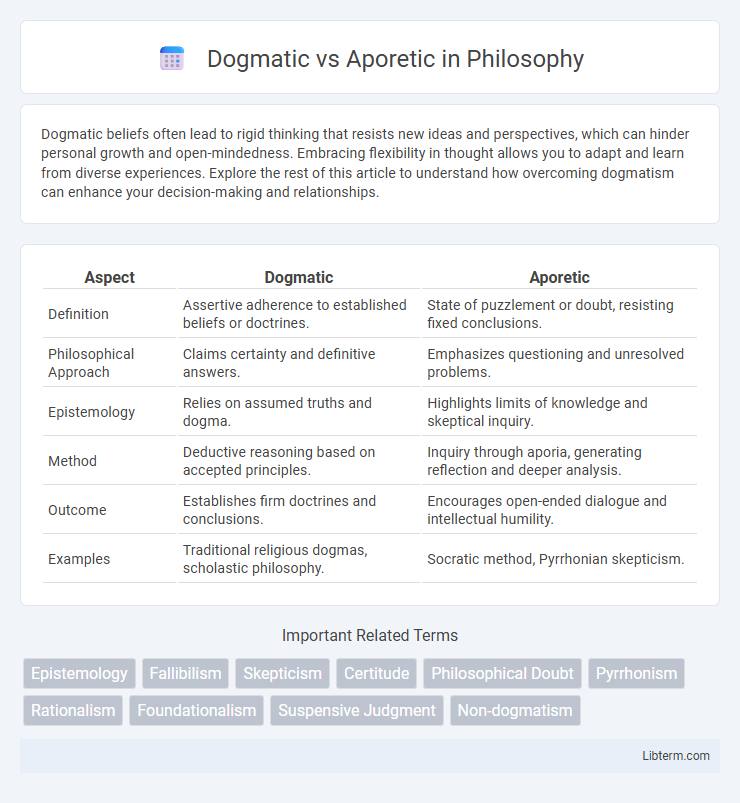Dogmatic beliefs often lead to rigid thinking that resists new ideas and perspectives, which can hinder personal growth and open-mindedness. Embracing flexibility in thought allows you to adapt and learn from diverse experiences. Explore the rest of this article to understand how overcoming dogmatism can enhance your decision-making and relationships.
Table of Comparison
| Aspect | Dogmatic | Aporetic |
|---|---|---|
| Definition | Assertive adherence to established beliefs or doctrines. | State of puzzlement or doubt, resisting fixed conclusions. |
| Philosophical Approach | Claims certainty and definitive answers. | Emphasizes questioning and unresolved problems. |
| Epistemology | Relies on assumed truths and dogma. | Highlights limits of knowledge and skeptical inquiry. |
| Method | Deductive reasoning based on accepted principles. | Inquiry through aporia, generating reflection and deeper analysis. |
| Outcome | Establishes firm doctrines and conclusions. | Encourages open-ended dialogue and intellectual humility. |
| Examples | Traditional religious dogmas, scholastic philosophy. | Socratic method, Pyrrhonian skepticism. |
Understanding Dogmatic Philosophy
Dogmatic philosophy asserts fixed principles and doctrines considered universally true, emphasizing certainty and authoritative knowledge. It often relies on established systems, such as metaphysics or theology, where beliefs are accepted without question to maintain coherence and stability. This approach contrasts with aporetic philosophy, which embraces doubt and unresolved questions to stimulate critical inquiry and exploration.
Defining Aporetic Inquiry
Aporetic inquiry involves a method of questioning that highlights puzzles and contradictions without immediately offering solutions, emphasizing the complexity and ambiguity inherent in philosophical problems. Unlike dogmatic approaches that assert fixed principles or doctrines, aporetic inquiry encourages continuous exploration and critical thinking by exposing aporia, or points of puzzlement. This method is central to Socratic dialogue, fostering deeper understanding through persistent questioning rather than definitive answers.
Historical Origins: Dogmatism and Aporia
Dogmatism traces back to ancient Greek philosophy, particularly rooted in the Stoics and Aristotelians who asserted definitive knowledge and unchanging truths. Aporia, originating from Socratic dialogues, embodies a state of puzzlement or impasse, emphasizing questioning over fixed conclusions. These historical origins highlight dogmatism's commitment to certain doctrines, contrasted with aporetic philosophy's embrace of doubt and inquiry.
Key Thinkers: Dogmatists vs Aporets
Dogmatic philosophers, such as Descartes and Spinoza, assert definitive knowledge through systematic reasoning and absolute truths, emphasizing certainty and foundational principles. Aporetic thinkers like Socrates and Sextus Empiricus highlight persistent doubt and unresolved questions, promoting continuous inquiry and skepticism without claiming conclusive answers. This contrast shapes epistemology by balancing assertive knowledge claims against critical examination and the suspension of judgment.
Fundamental Principles of Dogmatism
Fundamental principles of dogmatism emphasize unwavering adherence to established beliefs and doctrines, asserting absolute truths without room for doubt or questioning. Dogmatism prioritizes certainty and definitive answers, often resisting alternative viewpoints or ambiguity. In contrast, aporetic approaches embrace unresolved paradoxes and persistent inquiry, highlighting the limits of knowledge and encouraging intellectual humility.
Core Concepts in Aporetic Thought
Aporetic thought centers on exploring philosophical problems through questioning and highlighting contradictions, leading to a state of puzzlement or aporia. Unlike dogmatic approaches that assert definitive doctrines, aporetic inquiry prioritizes critical examination and intellectual humility. Core concepts include dialectical reasoning, suspension of judgment (epoche), and an emphasis on uncovering limits of knowledge.
Methodological Differences: Certainty vs Doubt
Dogmatic methodology prioritizes certainty by asserting fixed truths and relying on established principles as definitive knowledge. Aporetic methodology embraces doubt, emphasizing questioning, open inquiry, and the continuous search for understanding without claiming absolute answers. This fundamental difference shapes dogmatic approaches toward producing conclusive results, whereas aporetic approaches foster critical thinking and intellectual humility.
Impacts on Knowledge and Belief Formation
Dogmatic approaches assert definitive knowledge, often limiting inquiry and reinforcing fixed beliefs, which can hinder intellectual flexibility and critical thinking. Aporetic perspectives embrace uncertainty and doubt, fostering continuous questioning that drives deeper understanding and adaptive belief formation. This contrast significantly impacts epistemology by shaping either rigid frameworks or dynamic processes in knowledge acquisition and belief revision.
Contemporary Debates: Relevance Today
Contemporary debates on dogmatic versus aporetic approaches emphasize the tension between rigid certainty and productive skepticism in philosophical inquiry. Dogmatic stances often anchor legal, ethical, and scientific frameworks in unyielding principles, while aporetic perspectives encourage ongoing questioning and openness to paradoxes. This dynamic remains relevant in contemporary discourse, shaping dialogues on epistemology, political theory, and conflict resolution by balancing foundational beliefs with critical reflection.
Dogmatic and Aporetic Approaches in Practice
Dogmatic approaches in practice involve asserting fixed beliefs or principles as unquestionably true, often limiting exploration and adaptation in problem-solving or decision-making contexts. Aporetic approaches embrace uncertainty and contradictions, encouraging continuous questioning and critical examination to uncover deeper insights and innovative solutions. Organizations applying aporetic methods foster open dialogue and adaptability, whereas dogmatic frameworks may prioritize consistency and tradition at the cost of flexibility.
Dogmatic Infographic

 libterm.com
libterm.com